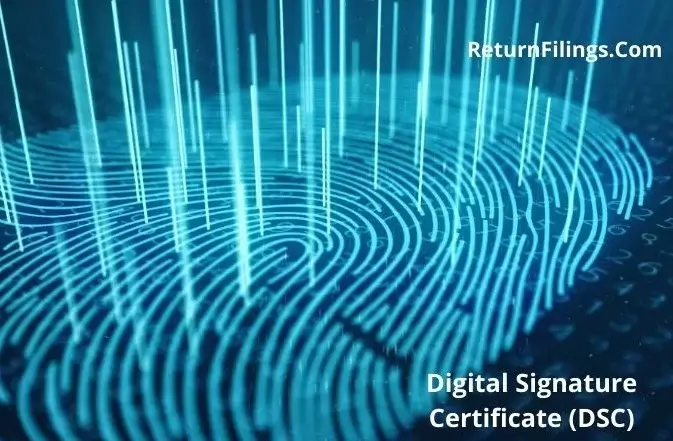Digital Signature Certificate (DSC) in India: Types, Uses & How to Apply
1. Introduction to Digital Signature Certificate (DSC)
Digital Signature Certificate (DSC) is an electronic form of signature that serves as proof of identity for an individual or entity in digital transactions. It ensures the authenticity, integrity, and security of electronic documents. The Information Technology Act, 2000, recognizes digitally signed documents as legally valid in India.
2. Types of Digital Signature Certificates (DSC)
DSCs are classified into three categories based on their intended usage:
2.1 Class 2 DSC
• Used by individuals and businesses.
• Required for e-filing of income tax returns, GST returns, and company filings.
• Authentication is based on a trusted and pre-verified database.
2.2 Class 3 DSC
• Offers the highest level of security.
• Required for e-tendering, government procurement, and online auctions.
• Issued only after in-person verification by a Registration Authority (RA).
2.3 DGFT DSC
• Specifically used for import and export-related filings with the Directorate General of Foreign Trade (DGFT).
• Available only to valid Import Export Code (IEC) holders.
3. Uses of Digital Signature Certificates
| Uses of Class 2 DSC | Uses of Class 3 DSC | Uses of DGFT DSC |
|---|---|---|
| Filing of Income Tax Returns | E-Tendering | Online DGFT Filings |
| MCA filings (Company/LLP) | Government e-marketplace (GEM) | Return Filing on DGFT |
| GST Return Filing | PSU tendering | Name Change on DGFT |
| Employee Provident Fund (EPF) & ESI Portal | ICEGATE, e-Sanchit, CHAs | Address Change on DGFT |
| Foreign Trade Portal | Customs e-Filing | Other DGFT e-filings |
4. Process of Obtaining a Digital Signature Certificate
4.1 Certifying Authorities (CA)
DSCs are issued by authorized Certifying Authorities (CAs) in India. Some of the leading CAs include:
• E-Mudhra
• Sify Technologies
• TCS Certifying Authority
• National Informatics Centre (NIC)
4.2 Application Procedure
Choose the Type of DSC – Select Class 2, Class 3, or DGFT DSC as per requirement.
Select a Certifying Authority – Apply through an authorized CA.
Provide Necessary Documents – Submit the following documents:
a. PAN Card (mandatory for individuals)
b. Aadhaar Card (for e-KYC verification)
c. Passport (for foreign nationals, along with an apostilled bank statement/utility bill)
d. Address Proof (Utility Bill/Bank Statement)
d. Verification Process – Aadhaar-based e-KYC or physical verification (for Class 3 DSC).
e. Receive DSC – Once verified, the DSC is issued and stored in a secure USB token.
5. Validity and Renewal of DSC
• Digital Signatures are issued with validity of 1 to 3 years.
• A DSC cannot be used post-expiry and needs to be renewed before expiration.
• Renewal requires a fresh application but may not require fresh identity verification if done through Aadhaar-based e-KYC.
6. Storage and Security of Digital Signature
• DSCs are stored in USB cryptographic tokens for enhanced security.
• Common USB tokens used include E-Pass, Trust-Key, and SafeNet.
• These tokens protect the private key and require a password for access.
7. Legal Recognition and Compliance
• As per Section 3 of the IT Act, 2000, DSCs are legally recognized in India.
• Government portals such as GST, MCA, Income Tax, EPFO, and ICEGATE require DSCs for authentication.
• Failure to use a valid DSC where required may lead to legal and financial penalties.
This guide provides a structured overview of DSCs, their applications, and the registration process. For any further assistance or Digital signature please reach out to us on email info@returnfilings.com or on whatsapp: https://wa.me/919910123091.
frequently asked questions (faq's) related to Digital Signatures in India
Q What is a Digital Signature?+
A A digital signature is an electronic signature that uses cryptography to provide authentication and non-repudiation. It's a secure way to sign documents electronically, similar to a handwritten signature but with added security features.
Q How does a Digital Signature work?+
A Digital signatures use a combination of public and private keys. The private key is used to create the signature, and the public key is used to verify it. This ensures that the signature is unique to the signer and that the document has not been altered after being signed.
Q What are the benefits of using Digital Signatures?+
A Key benefits include:
• Authentication: Verifies the identity of the signer.
• Non-Repudiation: Prevents the signer from denying their signature.
• Integrity: Ensures that the document has not been altered.
• Confidentiality (in some cases): Can be used to encrypt documents.
• Time-saving: Streamlines document signing processes.
• Cost-effective: Reduces paper usage and associated costs.
Q What is the legal validity of a Digital Signature in India?+
A Digital signatures are legally recognized in India under the Information Technology Act, 2000. They have the same legal standing as handwritten signatures for most purposes.
Q What is a Digital Signature Certificate (DSC)?+
A A DSC is an electronic certificate that contains your digital signature. It is issued by a Certifying Authority (CA) authorized by the Controller of Certifying Authorities (CCA) in India.
Q How do I obtain a DSC?+
A You need to apply for a DSC from a licensed Certifying Authority (CA). The process typically involves:
• Choosing a CA
• Filling out an application form (online or offline)
• Submitting the required documents (identity proof, address proof, etc.)
• Paying the prescribed fee
• Completing the verification process (which may involve in-person verification)
• Downloading the DSC
Q What are the different classes of DSCs?+
A DSCs are categorized into different classes based on the level of security and intended use. Common classes include Class 2 and Class 3 DSCs. Class 3 DSCs offer higher security.
Q What documents are required for a DSC application?+
A Document requirements can vary slightly between CAs but typically include:
• Proof of identity (Aadhaar, PAN card, Voter ID, etc.)
• Proof of address (Utility bill, bank statement, etc.)
• Passport-sized photographs
Q How long is a DSC valid for?+
A DSCs typically have a validity period of one or two years. They need to be renewed after expiry.
Q How do I use a Digital Signature?+
A You need a DSC and a compatible software application to use a digital signature. The process involves:
• Installing the DSC on your computer (usually through a USB token)
• Opening the document you want to sign in the appropriate software
• Selecting the digital signature option
• Entering your DSC password
Q Where can I use Digital Signatures?+
A Digital signatures are used in various applications, including:
• Income tax e-filing
• Online tenders and procurement
• Digital document signing
• MCA (Ministry of Corporate Affairs) filings
• Banking and financial transactions
Q What is a USB token for Digital Signatures?+
A A USB token is a hardware device that stores your DSC. It is considered a more secure way to store your DSC compared to storing it on your computer.
Q How secure are Digital Signatures?+
A Digital signatures are considered very secure due to the cryptographic techniques used. However, it is important to protect your private key (DSC password and USB token) to prevent unauthorized use.
Q What should I do if I lose my DSC token?+
A You should immediately inform your Certifying Authority to revoke the DSC to prevent misuse.
Q What is the role of the Controller of Certifying Authorities (CCA)?+
A The CCA is the government authority that regulates and supervises the functioning of Certifying Authorities in India.
Q How do I get a digital signature in India?+
A Apply to a licensed Certifying Authority (CA).
Q What is a digital signature certificate?+
A An electronic certificate containing your digital signature.
Q Where can I use digital signatures?+
A For various online transactions, e-filing, tenders, etc.
Q How much does a digital signature cost?+
A Check with the Certifying Authorities for their pricing.
Q What are the different types of digital signature certificates?+
A Class 2, Class 3, etc.
Q How long is a digital signature valid for?+
A Typically one or two years.
Q What is a DSC token?+
A A USB device for storing your DSC.
Q Is Aadhaar-based digital signature valid?+
A Yes, Aadhaar-based e-KYC services can be used for digital signing.
Q What is the IT Act 2000?+
A The Information Technology Act, which provides legal recognition to digital signatures.
- For further reading, explore the following topics:
- 🍽️ FSSAI Registration Process in India: Categories, Documentation & Compliance for Food Businesses
- 🏢 RERA Registration for Real Estate Projects in India: Process, Compliance & Penalties
- 📜 State-wise Professional Tax Registration in India: Key Rules, Filing Process & Compliance Guidelines
- 👥 Non-Executive Director Services in India: Roles, Legal Duties & Corporate Governance

